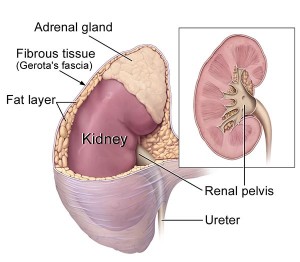Kidney Cancer

Several types of cancer can develop in the kidneys. Renal cell carcinoma (RCC), the most common form, accounts for 85% of all cases. In renal cell carcinoma, cancerous cells develop in the lining of the kidney’s tubules and grow into a mass called a tumor.
Early on kidney tumors do not produce symptoms but may be detected incidentally during the evaluation of an unrelated problem. As the tumor grows, symptoms may develop such as a lump or pain in your side, back, or abdomen or blood in your urine. If the tumor spreads to other organs, symptoms may develop in those organs.
Testing and Treatment
There are no blood or urine tests that directly detect the presence of kidney tumors. Instead, when a kidney tumor is suspected, your doctor will order an ultrasound, CT scan or MRI of the abdomen. Additional imaging studies can be used to determine the cancer’s stage and grade.
Treatment
When the tumor appears confined to the kidney (a “localized” tumor), there are two main treatment options.
- Surgery: A radical nephrectomy involves the urologist removing the entire kidney, adrenal gland and surrounding tissue. A partial nephrectomy removes only the tumor in the kidney along with some surrounding tissue in order to preserve as much normal kidney tissue as possible. This procedure is used for tumors smaller than 4 cm and are located in certain parts of the kidney. Radical and partial nephrectomies can be preformed through a traditional “open” surgical incision or using minimally-invasive techniques including laparoscopic and robotic surgery.
- Tumor ablation: destroys the tumor without surgically removing it. This can be accomplished by freezing the tumor (cryotherapy) or using high energy waves (radiofrequency ablation) to destroy the tumor. Ablation can be accomplished during open surgery, laparoscopy or percutaneously (through the skin).
Kidney cancer that has spread to other parts of the body or has recurred may not be curable, but it may be controlled with the following therapies.
- Surgery: to remove as much as the tumor as possible
- Immunotherapy: Drugs that stimulate your immune system to fight the cancer
- Targeted therapy: Drugs taken orally or orally or intravenously to block signals the tumor send that drive the cancer’s growth
- Radiation Therapy: to control or reduce symptoms of kidney cancer that has spread to other areas of the body
Frequently Asked Questions
If I have cancer in one of my kidney’s will the other kidney develop cancer?
Renal cell carcinoma usually grows as a single tumor within one kidney. Sometimes both kidneys develop tumors at the same time.
Can I have a kidney transplant to treat my kidney cancer?
A kidney transplant is not a treatment option for kidney cancer. Most people have two kidneys and can function normally with one healthy kidney or even a portion of one kidney. Dialysis is rarely necessary.
Can kidney cancer be treated with chemotherapy?
Traditional chemotherapy does not treat kidney cancer. This is because the cancer has developed mechanisms to prevent the effectiveness of the chemotherapy. However, targeted therapies can be helpful. These treatments are directed at blocking growth factors for the tumor.




















